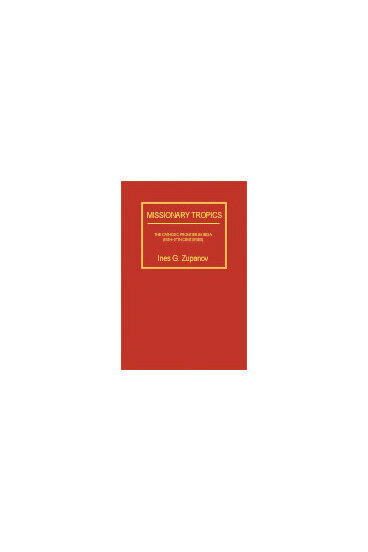Missionary Tropics
The Catholic Frontier in India (16th-17th Centuries)
A provocative contribution to the history of early modern Euro-Asian interactions that provides new perspectives on the encounter between Catholicism and Hinduism in India
Description
By focusing on the Jesuit missionary discovery of Indian "pagan" Hinduism, Zupanov traces the stages of the Jesuit's disconcerting journey into religious relativism or accommodation. At every point of this Euro-Asian encounter, the emerging Catholic communities attempted to twist and turn their own received religion to fit their various collective and/or individual interests. This turning or "troping" of the Jesuit message into pre-Christian modes of religious expression produced the "tropics" of the title.
Drawing upon a variety of sources in Portuguese, Italian, Spanish, Latin and Tamil, Missionary Tropics documents the construction of the Indian vernacular Catholicism or "Tropical Catholicism" through a complex layering of missionary religious and social intentions and indigenous responses. By following Galenic humoral medical theory, the Catholic missionaries defined paganism as a natural outgrowth of the hot and humid climate. Reflecting the complex layering of the missionaries' religious and social intentions and the subsequent indigenous responses, this book should be of interest to all those who study religious encounters and are interested in the issues of religious conversion in the early modern world, in India, and elsewhere.
Ines Zupanov is Senior Research Fellow, Centre National de la Recherche Scientifique, Paris.
Ines Županov is Senior Research Fellow, Centre National de la Recherche Scientifique, Paris
Reviews
". . . a provocative contribution to the history of early modern encounters between Jesuits and learned guardians of Sanskriti and Tamil traditions in South India, and also provides fascinating new perspectives on the interactions between Catholic and Hindu cultures. . . . This work should interest scholars who study cross-cultural encounters and religious conversion in early modern times, whether in India or in other parts of the world. It is also itself a 'trope' that represents what is currently highly fashionable within some circles of academia."
- Robert Eric Frykenberg, Emeritus, University of Wisconsin, Madison
—International Bulletin of Missionary Research
"The unquestionable scholarship of the author and her close reading of voluminous primary-source materials make her analysis of considerable interest to other researchers in the area and ought to interest general readers as well...Zupanov does create an interesting historic tapestry, employing many and varied cultural threads and with as many layers of meaning as she can incorporate into it."
- James D. Ryan, Bronx Community College, CUNY
—Renaissance Quarterly
"On the whole the book is well researched, well written, and well structured, and I congratulate the author for it."
- Cyriac K. Pullapilly
—Cyriac K. Pullapilly, Saint Mary's College
"Ines G. Zupanov has written an engaging account of the relatively neglected story of Jesuit mission work in the Portuguese empire in India."
- Jeffrey Cox, University of Iowa
—American Historical Review
"...Zupanov's Missionary Tropics is a particularly timely and welcome addition...successfully raises important issues about cultural dialogue and religious translation/transmission."
- Liam M. Brockey, Princeton University
—Liam M. Brockey, Itinerario

